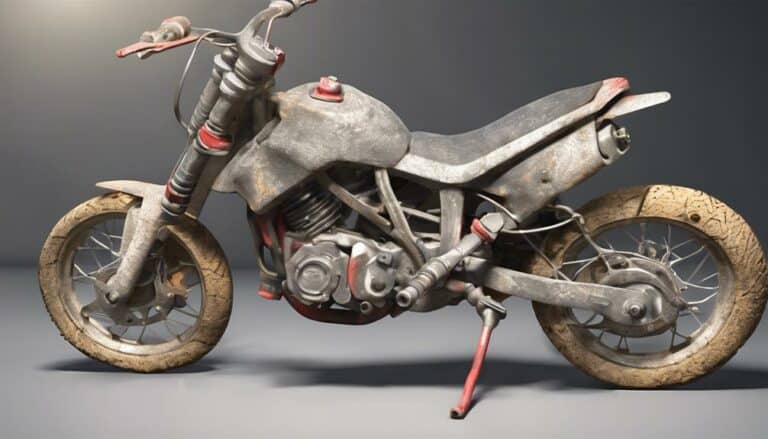When inspecting dirt bike brakes, prevent brake pad/rotor contamination by using proper bleed blocks. Be cautious of incorrect brake fluid usage altering performance and system damage. Aged brake fluid compromises safety – utilize fresh, sealed containers only. Over-tightening bleed adaptors can damage o-rings, so tighten only to finger tightness. Avoid leakage by not over-filling the brake system; reset caliper pistons and vent excess fluid carefully. Attention to details like these guarantees safe biking.
Key Takeaways
- Remove brake pads before bleeding to avoid contamination.
- Use the correct brake fluid to maintain performance.
- Do not use old brake fluid to prevent safety risks.
- Avoid over-tightening bleed adaptors to protect o-rings.
- Prevent over-filling the brake system to maintain efficiency.
Brake Pad/Rotor Contamination
To prevent brake pad/rotor contamination during a dirt bike brake inspection, make sure you remove the wheel and brake pads before commencing the bleed process. Contamination can occur when brake fluid comes into contact with the brake pads or rotor surfaces, leading to decreased braking performance and potential safety hazards. Brake pads are designed to grip the rotor tightly to stop the bike efficiently. If brake fluid contaminates the brake pads, it interferes with their ability to create friction against the rotor, resulting in compromised braking power.
During the bleeding process, using a bleed block is essential. This tool helps keep the brake pads free from any brake fluid that may be expelled when bleeding the brakes. Additionally, be cautious not to overfill the brake system with brake fluid, as this can lead to contamination issues. Symptoms of pad/rotor contamination include having a firm brake lever but experiencing poor stopping performance. Remember, brake fluid acts as a lubricant, reducing friction between the brake pads and rotor, so any contamination can have a significant impact on braking efficiency.
Wrong Brake Fluid Usage
Using the improper brake fluid in your dirt bike's brake system can lead to detrimental changes in performance and potential damage to internal components. It's essential to follow the manufacturer's specifications when choosing brake fluid for your bike.
Different brake fluids have varying compositions and properties, such as different boiling points and viscosities, which directly impact brake performance. Using the incorrect type of brake fluid can result in alterations to the brake feel, reduced braking efficiency, and harm to internal seals due to incompatible chemical interactions.
Before conducting a brake inspection, always consult the manufacturer's recommendations to make sure you're using the appropriate brake fluid. Using the right brake fluid helps maintain excellent braking performance, prevents internal corrosion, and ensures the longevity of your brake system.
Use of Old Brake Fluid
Old brake fluid in your dirt bike's brake system can compromise performance and safety due to its hygroscopic nature, which leads to decreased boiling temperature and potential corrosion. When brake fluid absorbs water from the air, it lowers its boiling point, increasing the risk of brake fade under heavy use. Additionally, the water content in old brake fluid can cause changes in brake feel and responsiveness, impacting your ability to control the bike effectively.
To prevent these issues, it's important to avoid using brake fluid from an old container. Brake fluid stored in a container that has been opened for an extended period may have absorbed moisture, reducing its effectiveness and potentially causing internal seal damage within the brake system.
To maintain top-notch brake performance, always use fresh brake fluid from sealed containers. By doing so, you make certain that your dirt bike's brake system operates at its best, providing you with the stopping power needed for a safe and enjoyable ride.
Over-Tightening Bleed Adaptors
Avoid risking damage to rubber o-rings by refraining from over-tightening bleed kit fittings during brake maintenance procedures. When dealing with bleed adaptors, remember that finger tight is all you need; using tools to tighten can spell trouble. Over-tightening these fittings can crush, stretch, or deform the o-ring, potentially leading to leaks in the brake system.
Should you find it challenging to achieve a proper seal, consider slightly loosening the fitting to alleviate pressure on the o-ring. Effective brake bleeding relies on properly sealed fittings, so it's vital to treat them delicately. By exercising caution and not exerting excessive force when securing bleed adaptors, you can safeguard the integrity of the o-ring and maintain the efficiency of your brake system.
Over-Filling Brake System
When bleeding your dirt bike's brakes, make sure you prevent over-filling the brake system by resetting caliper pistons before proceeding with the maintenance. Over-filling can lead to issues such as brake fluid leakage, reduced braking performance, and potential damage to the brake system components.
To avoid this, start by removing the brake pads and pushing back the pistons to create space for the additional fluid. Inserting a bleed block between the pistons can help maintain the correct brake fluid level during the bleeding process.
If you find that you have over-filled the system, excess brake fluid can be removed by venting from the highest point in the brake system. Remember to loosen the lever bleed port screw or reservoir top cap to allow the excess fluid to escape.
Conclusion
So, now that you know the common mistakes to avoid during a dirt bike brake inspection, make sure to steer clear of these pitfalls.
Keep your brake pads and rotors free from contamination, use the correct brake fluid, avoid using old brake fluid, don't over-tighten bleed adaptors, and never over-fill your brake system.
Remember, a well-maintained brake system is vital for your safety and performance on the trails.
Happy riding, and may your brakes always be in top shape.

